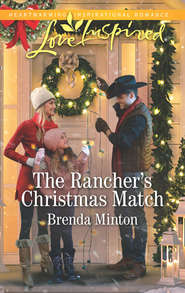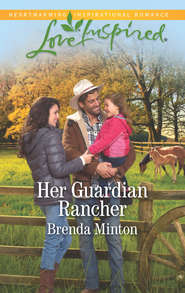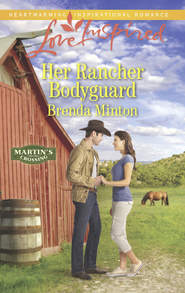По всем вопросам обращайтесь на: info@litportal.ru
(©) 2003-2025.
✖
Second Chance Rancher
Настройки чтения
Размер шрифта
Высота строк
Поля
Chet let out a long sigh. “Doc said I have to cut back on sugar.”
A waitress flitted past, saw Chet’s empty coffee cup and refilled it. Chet winked at her and reached for the sugar jar but Essie moved it away from him. The maneuver earned her a scowl from the older man.
Essie didn’t back down. She pointed a finger at Chet. “You put five spoons of sugar in every cup of coffee, old man. I guess it’s time you put a stop to that.”
“You’re a hard woman, Essie.” Chet lifted the cup in salute.
“Yes, well, I kind of like having you around. Even if you’ve never left more than a fifty-cent tip, you’re a good neighbor.”
Chet ignored her and sipped his coffee and grimaced. As he set the cup down he turned his attention to Lucy. “Are you back for good, Lucy?”
Dane watched her flick a glance in the direction of her younger sister, a hesitant look on her face. “I’m back for now.”
It wasn’t much of an answer. Not that it mattered to him. But it probably mattered a lot to her sister. A tug on his sleeve brought his attention back to the table. Issy’s small hand was on his arm and she leaned close.
“Do I get cake now?” she whispered.
“Yes, you get cake.” He kissed her cheek. “After you eat dinner.”
She came up on her knees, wobbling a bit on the seat. He steadied her, making sure she was firmly planted in the middle of the chair. “Daddy, is it a party?”
“Kind of.”
A hand reached past his shoulder. He glanced up as Lucy placed chocolate cake in front of his daughter. She leaned over, whispering in Issy’s ear that the cake was right in front of her. With a gentleness that belied her tense expression, Lucy guided his daughter to a fork and helped her locate the cake.
Lucy Palermo was an enigma. But then again, she wasn’t. There was a scar on her cheek, small and faded. She’d had that scar since the night her father caught them in town together. Another scar on her arm was more recent. He knew about the attack in Afghanistan.
There’d been years of abuse and no one in town had stepped in to stop it. His own family had been guilty of turning a blind eye to the problems on the ranch next door. His dad hadn’t wanted to get involved. His mom had commented that it was a shame and Mrs. Palermo should have taken the kids with her when she left.
Lucy started to step away but her gaze caught his. He schooled his features with an easy smile. Lucy froze, her dark eyes holding his captive. Finally she shook her head, as if shaking free from memories.
As she walked away he had an uncharacteristic thought, one that had nothing to do with the past and everything to do with the present. But their history belonged firmly in the past. It had been a summer romance that ended with casualties.
They were different people now. She had come home with more scars. He had his own scars and his own motivations for making wiser choices. They were both wounded, and in this situation two halves didn’t add up to a whole. Instead it would just be two broken people making a mess of not just their lives, but the lives of the people who counted on them.
But there were certain things he couldn’t deny. She still looked good in jeans. And she could still get his attention with a look.
Chapter Four (#u8a35d801-bbe0-5468-bc13-25b7475bf542)
Lucy walked down Main Street, enjoying the quiet spring morning. It was Monday and Bluebonnet was peaceful, with few cars parked along the narrow street and businesses just opening up. She stopped in front of Lawson’s Five and Dime. The department store had been a mainstay in this tiny town since the early 1900s, and it had been a mainstay in Lucy’s life for as long as she could remember. Mrs. Lawson, the fourth Mrs. Lawson to stand behind the counter of the store with free gum for every child, had been a favorite of Lucy’s.
Harriet Lawson had attended the Church of the Redeemed. But she hadn’t stayed long. She’d stood up to Jesse Palermo, calling him out for his treatment of his family.
Saturday evening at the diner she’d given a moving speech about the new Community Church and shelter, talking about lives being changed for the better and women finding freedom from abuse. The irony hadn’t been lost on Lucy. A church that had once destroyed was now in the business of rebuilding.
A movement inside the building caught her attention. She saw Mrs. Lawson move through the shop. The older woman waved and smiled big as she hurried toward the door, waving keys in silent communication. Lucy hadn’t planned on talking. She’d just been lost in thought and she’d stood there too long.
Keys turned in the lock and the door opened. Mrs. Lawson, short dark hair, an apron over her jeans and T-shirt, stepped out on the sidewalk and pulled her into a hug that Lucy had no way to pull free from.
“Lucy Palermo, it’s so good to see you back in town. And I was so thrilled to see you at the dinner Saturday evening.” She let go and stepped back from the hug. “Come inside. I just put on a pot of coffee.”
Lucy glanced around. “I just had breakfast at Essie’s.”
“Oh, come on. You aren’t here by chance. You have questions.”
Did she?
Mrs. Lawson motioned her inside the store. Lucy followed and she couldn’t help but inhale the familiar scent of polished wood, the favorite perfumes of every woman in town, and something distinctly cinnamon.
The aisles were still crowded, the lights were still too dim, and because she’d grown up, the store seemed smaller than it had to the little girl Lucy had once been. She followed Mrs. Lawson down one of those narrow aisles cluttered with dishes that had been on sale since Lucy’s childhood. No one seemed to want the harvest gold ceramic ware.
Lucy could smell freshly brewed coffee. Mrs. Lawson motioned her inside an office with dark green furniture and a ceiling fan that clicked as it circulated stale air.
“Have a seat.” She pointed to a chair. “Sugar in your coffee? And I have snickerdoodles. I know they’re not an acceptable breakfast food but I baked them for the ladies at the shelter and couldn’t resist.”
“Black coffee and I’d love a cookie.” She didn’t really want to talk about the shelter. She knew it was coming, though. Mrs. Lawson was giving her those quick, covert looks, as if she expected her to bolt any second.
Once they had their coffee, Mrs. Lawson settled herself at the desk. She finished off a cookie, wiping crumbs from the front of her shirt, and then she settled her well-meaning gaze on Lucy.
“You’ve done well for yourself,” Mrs. Lawson said. “I always worried about you kids. I should have done more after I left the church but I just didn’t know what to do. When your mom left, I thought she’d take you kids with her. I guess I shouldn’t have been surprised when she didn’t.”
“Water under the bridge,” Lucy said. She eyed the exit, wishing she could escape the store and this conversation. Who would stop her?
Mrs. Lawson reached out, as if she meant to stop her. But she drew her hand back and settled in her chair.
She reached for another cookie. “Lucy, I don’t have a right to give you advice. Except that I feel somewhat responsible. In the beginning we followed your father and his teachings. I’m not sure how we were so gullible. I look back and can’t fathom that I would be pulled in to something so wrong. But it was wrong. It was destructive. It left people shattered. Including you kids. That’s one reason we’re all so thankful for Pastor Matthews and his vision for that church. The new ministry helps people escape abusive situations. It lifts people up, the way God intended. I’d like for you to visit because I want you to experience God and not the false gospel your father preached.”
Lucy set her coffee cup on the desk and stood to go. But she wouldn’t walk away angry, because Mrs. Lawson had the best intentions. She knew, better than anyone, what the Palermos had been through. She’d been through it, too.
“Lucy, I’m sorry. I guess I’ve overstepped.”
“No, you didn’t. I know you mean to help. I know the new church is trying to do the same. But I’m not here to be a part of this church. I’m not even planning to stay in Bluebonnet.”
“I’m sorry to hear that. But I hope you’ll at least stop by the church.”
Lucy paused at the door. “I appreciate you talking to me. And I will stop by the church.”
She left the five-and-dime and headed for her truck, done with town, with well-meaning friends, with long, questioning looks from locals who weren’t sure about her.
As she headed out of town, she took a right turn. She hadn’t really planned to go by the church but curiosity was stronger than her best intentions. She wanted to see what had happened to the building, the ministry and the people she had known. Mrs. Lawson was an example of people who had moved on. They hadn’t allowed her father’s ministry to determine their future. Or they had, but in a positive way. They were giving back rather than holding themselves back.
Lucy had always held herself back, except for that one summer with Dane when she’d really allowed herself to feel. She’d always been an outsider, the child on the edge of the playground, the adult at the edge of social groups. She’d been trained from early on not to talk, not to share, to let no one in. She realized now that her father had done that to them, not to protect them, but to protect himself.
The church building was L shaped. There was the main sanctuary with a bell tower. The double doors of the vestibule faced the street. A wing added on when she was a child was attached to the back of the main sanctuary. As she pulled up there were a few women working in the flower gardens. A man on a ladder was repairing roof gutters.
Suddenly the women stopped working. They watched her as she pulled into a parking space. She couldn’t see their expressions but from their body language she knew they were nervous, maybe fearful. One of the ladies ran back inside, using the side door of the building. The man on the ladder descended.
An old beat-up truck pulled in next to hers. The man getting out was thin. His hair was shoulder length. He hadn’t shaved in a while but the beard didn’t hide the pasty complexion of a drug addict or the scars on his face.











